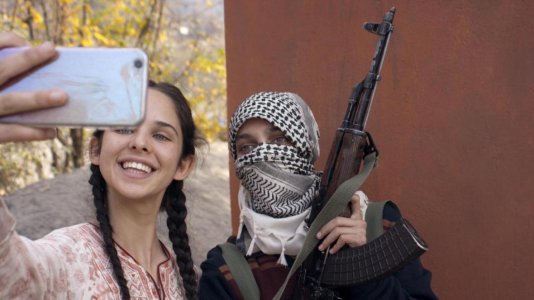Cpt. Rishwat
T20I Captain
- Joined
- May 8, 2010
- Runs
- 44,254
Indian film zooms in on Kashmir’s secret war
Selfie-obsessed 16-year-old Noor from Birmingham is not exactly overjoyed when she is dragged by her single mother to a remote village in Kashmir to visit her grandparents.
Once there, however, she falls for a local teenager, Majid, and discovers that the father she thought had abandoned her was one of thousands of young men “disappeared”, allegedly by Indian security forces. His best friend was Majid’s father, who also disappeared.
Noor and Majid are fictional characters, and their romance, which sees them stumbling on a mass grave and detained by the military, is the plot of a film, No Fathers in Kashmir, which opened in the UK last month.
It is a rare window, however, into the reality of life in what was once an idyllic Himalayan valley, where tourists lounged in houseboats. Kashmir is now one of the most militarised regions on earth, the scene of a secret war.
No Fathers is the first Indian film to reveal atrocities by its military, showing them responsible for torture, mass graves and disappearances. It is nuanced, however, showing excesses on both sides.
It was made by the Oscar-nominated director Ashvin Kumar, who last week got his first death threat — a warning on a YouTube video: “We will do to you what we did to Gauri Lankesh”, a journalist shot dead outside her house in Bangalore, southern India, in 2017.
So he needs no reminding that Kashmir is a highly sensitive issue. As a Muslim-majority state in a Hindu-majority country, it is disputed between India and Pakistan, which have fought several wars.
Kumar went there every year to visit his Kashmiri grandfather until 1989, when he was 14 and an insurgency began, quickly backed by Pakistan. He did not go back until 2009 and found his childhood memories quickly shattered.
“It was a brutal homecoming — all blood and gore and soot and teargas,” he said. “I found myself behind stone-pelters when they were attacked by the army and had to run into someone’s home. I had that sense of barbed wire, blood on streets, women and young men running to dodge soldiers.”
He also met women whose sons or husbands had disappeared. “I was deeply disturbed that these atrocities were being carried out in my name as a citizen of the biggest democracy on earth,” he said. “And also that for all the thousands of bodies buried, not a single one of the Indian armed forces perpetrators has been brought to book.
“There is a shocking lack of information in India on what’s happening inside Kashmir,” Kumar said.
“In India today, we’ve got into this binary hate-filled rhetoric of ‘them and us’ and not allowing other voices. What needs to happen is to start understanding what the ordinary Kashmiri is going through.
“I wanted to show people a Kashmiri is not someone who just picks up a stone and throws it at an army man: they want freedom and that has been denied.”
He made two documentaries, both of which were banned, before deciding that a feature film would have more impact.
“I thought I would talk about the human aspect — the women and children who are the biggest collateral.”
Last August, Narendra Modi’s government placed the entire state of Kashmir on lockdown, cutting off phones, internet and television, closing schools, locking up its political leaders and sending in tens of thousands more troops. Six months on, Kashmir’s 12 million people remain under siege, with only limited communications restored, guarded by more than 500,000 troops.
“They have turned Kashmir into a giant concentration camp,” said Kumar. It’s collective punishment.”
He had a 9½-month battle with Indian censors to get his film onto the big screen — and, once released at last, it was blocked after three days, and a broadcast deal was revoked. “The government just want to stifle dissent,” he said.
Screenings in the UK’s Kashmiri communities have been packed and animated. This week Kumar is releasing a short documentary called Four Daughters, in which the daughters of two army officers killed in Kashmir meet the daughters of two dead militants.
“We need to have these conversations,” he said.
https://www.thetimes.co.uk/edition/world/indian-film-zooms-in-on-kashmirs-secret-war-3h23jv8nl
Does anyone else find the idea of locking down an entire region with half a million troops disturbing? Imagine that in the UK. It just wouldn't happen, thank God.






